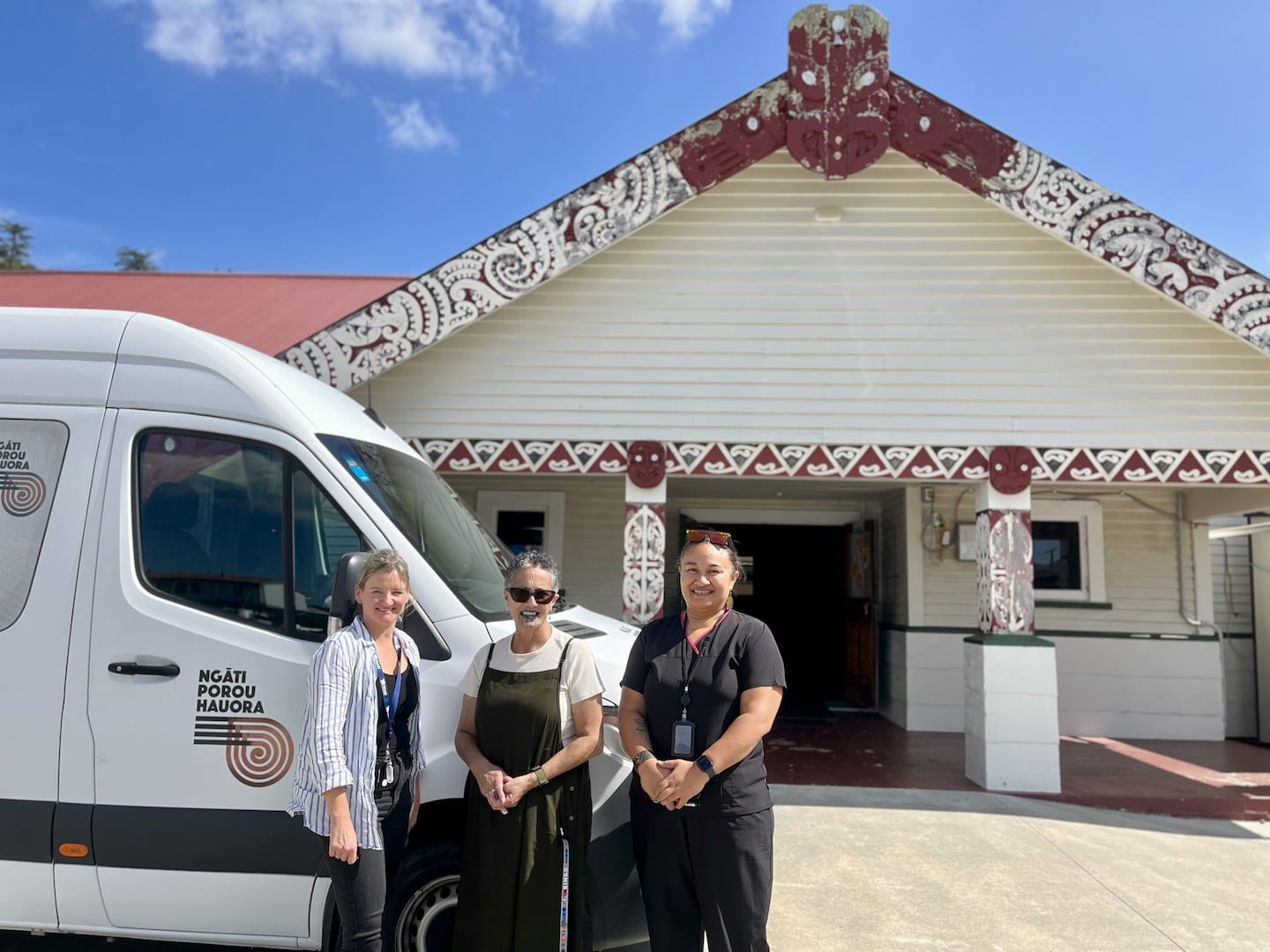A hauora clinic on wheels opened its doors for the first time in Gisborne this week, providing free health services to people in need.
The clinic will be at Te Poho-o-Rāwiri Marae on the last Thursday of every month from 9am to 3pm.
The marae partnered with Pinnacle Midlands Health Network, Ngāti Porou Oranga, and Tūranga Health to make it happen, marae chairwoman Charlotte Gibson said.
The clinic could prescribe medications and make referrals.
“No wait time, no booking, just turn up and they will see you,” Gibson said.
“This kaupapa under the name of Poua te Ora is the first marae-based type clinic.”
The clinic is staffed by nurse practitioner Jade Robertson and paramedic Raewyn Lawrence.
Robertson said it was a beautiful first day, and the karakia ceremony helped connect the partnership between the providers.
Lawrence said she was nervous and excited.
“We are trying to get it out to as many people as possible who can’t access primary healthcare.”
Lawrence and Robertson said that although the mobile clinic was new for Tairāwhiti, it had been established in other areas of New Zealand.
Gibson said the idea was seeded during Cyclone Gabrielle when the marae hosted a hub of social services temporarily, including the Ministry of Social Development, Kāinga Ora, Temporary Housing, Inland Revenue, and a pop-up clinic from Pinnacle.
“And what we found was people actually came. That planted the seed.”
Gibson said the clinic was one way of bridging the gap in the current wait times at doctors’ clinics.
“Sometimes a nurse is enough, but [people] just can’t get into the [doctors] practice.”
She said the clinic supported Māori, who statistically faced challenges accessing primary care.
“It’s open for anyone, but predominantly, the health statistics are saying our people are in dire need. If they are not getting to the hospital or doctor for whatever [reason], this might be a better option for wellness for them.”
The mobile clinic was repurposed from Ngāti Porou’s Covid-19 vaccination van.
Behind the clinic were kids from multiple schools playing on the pā’s newly opened basketball court.
On the same day the clinic opened, the marae hosted a pōwhiri for all of the kura kaupapa Māori rūnanga across the country to have their annual trustee meeting.
“These kids at school get taught about manaakitanga [and] kotahitanga ... This is kotahitanga in action,” Gibson said.
“It’s everyone doing something for the betterment of each other.”
Gibson said the clinic’s public presence normalises the practice.
“All our kids know this is here, and it’s a clinic, and they can come and see the doctor. The tutors, the parents that are here offering support, they know ... just pop in if you need to see someone.
“I suppose when you go to any clinic, it’s very sterile ... whereas here you can get a cake, you’re going to get a cup of tea.”
Gibson said they would like to open the clinic once a week, but will first see how popular the clinic becomes and if the hours work for people.
Describing “Poua Te Ora’s” meaning, Gibson said “A Pou” is a stake in the ground, meaning “that’s enough”.
Te Ora means “look, here we are, we think you’re worth it – you’re health is a priority”, Gibson said.
The goal was to have different social services come to the marae on different days of the week, such as the Ministry of Social Development (MSD), under the umbrella of Poua Te Ora, according to Gibson.
“My next hui is with MSD, we’re going to look at them coming once a week. Housing [services] is another we need to look at.”
They also plan to have rongoā sessions and teaching facilities for Poua Te Ora as a stance of mental, physical, and spiritual wellbeing.
“We might have an open day where we will say, come in and we will show you how to make something.
“Our pā, means papakainga, which is a whole pā where everyone lives, you’re all welcome to come here as long as you believe in this ... Kids who come to our kohanga reo, they’ve got to commit to that kaupapa of learning te reo Māori and somehow contributing here whenever they can.
“Across the road, our kura kaupapa Māori will start being built hopefully by the end of the year, (Te Kura Kaupapa Māori o Horouta Wānanga).
“[We’ve] bought some of the houses across the road, we’ve bought some sections over there.
“That becomes a papakāinga, you’ve got a kohanga reo, a kura, and we want to get a high school established ... You have your own doctors, your own everything ... that’s our absolute dream, and we’re going to make it happen.
“Once you put pou in the ground, you’ve got to commit to it,” said Gibson.
LDR is local body journalism co-funded by RNZ and NZ On Air.



